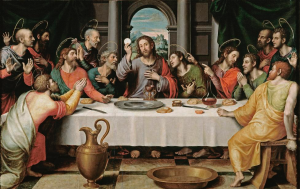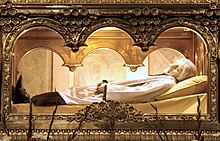HOMILY HOLY THURSDAY
Freedom to Serve
(Ex 12:1-8, 11-14; 1 Cor 11:23-26; Jn 13:1-15)
*******************************************
This celebration tonight begins the three great liturgical days of the year – what we call the Easter Triduum. The feast tonight, Holy Thursday, and indeed every Eucharist, has one message – love one another as Jesus has loved us. Our life is a gift to be given away. We are to be there for one another, and for the world.
Perhaps you noticed, as you listened to the readings, there is a natural dynamic flow connecting each reading with the others.
The first reading from Exodus is all about the political liberation of the chosen people by the flesh and blood of a lamb that is sacrificed and consumed as sacred food.
 The second reading from St Paul to the Corinthians identifies Jesus as the new Paschal Lamb whose flesh and blood is now present in the Eucharist he instituted at the Last Supper; the event we celebrate this Holy Thursday. It is this Body and Blood of Christ that now liberates us spiritually from all our sin and sinfulness and that gives us new life through his Spirit.
The second reading from St Paul to the Corinthians identifies Jesus as the new Paschal Lamb whose flesh and blood is now present in the Eucharist he instituted at the Last Supper; the event we celebrate this Holy Thursday. It is this Body and Blood of Christ that now liberates us spiritually from all our sin and sinfulness and that gives us new life through his Spirit.
The gospel of John pointedly substitutes the washing of feet in the place of the institution of the Eucharist in the Synoptics, the other three gospels. The message here is clear – it is in loving, selfless, sacrificial service to others that the dynamism of the Eucharist is to be found and lived out.
To sum up, the God who liberated the Hebrews from slavery in Egypt through the Passover Lamb, now liberates us from all sin and sinfulness through the true Lamb of God, Jesus Christ, and his love made present in the Eucharist. It is interesting that the Samaritans in the Holy Land still practice animal sacrifice, believing somehow that will make them holier. A Samaritan priest showed us the Torah they use, and then took us to the place where they perform their sacrifice – a series of long trenches covered with grates. The Napateans in Petra, Jordan, levelled off a mountaintop to provide a place where they could perform animal sacrifice, such was this deeply rooted human need to assure divine protection. The Aztec in Mexico used to sacrifice humans on the huge pyramid of the sun to appease their sun god.
How blessed we are to offer to God not the flesh and blood of animals, but the sacrifice of God’s Son on the Cross, that revealed to us the depths of the Father’s love for us. That same loving God now missions us to go out and live the Eucharist through loving service of our fellow human beings and of all creation.
John Bell of the Iona Community in England invited a black South African woman to share her story on television. She was running an orphanage for children whose parents had died of HIV/AIDS. Her love and commitment to these children was total and unconditional. Her words were simple and direct. He asked her what she would like to leave behind as her legacy. She thought a moment and replied the legacy she would like to leave behind would be to have spent everything she had, that she would meet God empty-handed because she had used up completely every gift God had given her. She wanted to leave nothing behind except a little footprint that might help others find their way. In that way she was like Jesus, who came not to be served, but to serve, and who emptied himself, gave up his life for us on the cross.

St Jean Vianney
Someone else who was like that was the Curé of Ars in France, known as St. John Vianney. He was famed as an insightful confessor and spent hours every day in the confessional. People would come to him from miles around, even from other countries in Europe, for spiritual direction and to celebrate reconciliation with him. He had great insight and sometimes startled some penitents with his intuition and knowledge of their inner life. His philosophy was to give everything away. He constantly gave away to the poor around him everything that he received from those who came to him for confession. Being a channel of God’s merciful love and giving away everything to the poor, was his way of living out the Eucharist.
A familiar old hymn captures in one stanza the spirit of this Holy Thursday celebration: Called from worship into service; forth in his great name we go. To the child, the youth, the aged, love in living deeds to show.
So, as we celebrate tonight the gifts of priesthood and Eucharist given out of tremendous love by God to the Church, let us appreciate the Eucharist as a sacrament of God’s merciful, forgiving unconditional love, and as a commitment to show that love to all through selfless loving service.




This is another wonderful homiliy and reflection about the Last Supper. All his disciples are gathered around the table to eat this last meal because Jesus is about to be arrested and crucified. Here we are offering ourselves to God ; meaning we will follow your word and do our best to live out your word. So, letting Jesus wash our feet is allowing him to forgive and love us. We should be powerless, selfless and humble by allowing Jesus to enter our lives. When we receive the communion or banquet then we are receiving Jesus flesh and blood . He will do any intentions of take away our sins and heal us physically and emotionally. The Lamb of God who takes away the sins of world ; have mercy on us. Once we receive the communion then we should experience Jesus ‘ mercy, forgiveness, unconditional love and compassion to other people. Amen. Thanks be to God.
Thanks Bishop Sylvain Lavoie for Sharing this The Last Supper and washing of the feet. It is a great lesson to learn . It is well written . May God Bless you. Gracias!